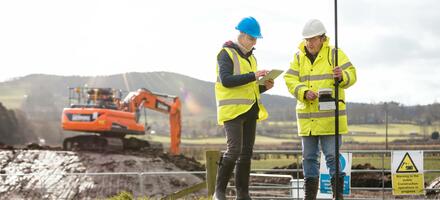
Consequences of over-reliance on software in construction
Progress indicator

With digital technology integrated into so many parts of our daily lives, Andrew Harrison CQP MCQI asks: what are the consequences on quality in construction projects as the industry relies increasingly on software rather than traditional skills.
In today's construction industry, software has become an integral part of project management, design, and execution. From CAD (computer-aided design) modelling to scheduling tools and cost-estimation software, digital solutions have streamlined operations and improved efficiency.
However, while technology undoubtedly offers benefits, the industry’s increasing dependence on software is leading to a troubling decline in traditional skills – those core abilities that have long defined the expertise of construction professionals.
Rise of software in construction
The construction industry has embraced technology to address inefficiencies and enhance productivity. Design software enables architects to produce highly detailed drawings, although this point is another aspect that has been subject to poor quality performance, which can be further explored. Meanwhile, project management tools assist with scheduling, and estimating programs provide real-time cost forecasts. These digital advancements have drastically improved accuracy and reduced manual workload.
Yet, the convenience of these tools has led to an unintended consequence: the gradual erosion of fundamental construction knowledge and critical thinking skills.
The diminishing role of core abilities
Many seasoned professionals express concern that younger generations entering the industry often rely on software for problem-solving, rather than developing a deep understanding of construction principles. For instance:
- Loss of manual drafting skills: While CAD programs have revolutionised design, the ability to sketch and manually draft concepts is becoming rare.
- Decline in on-site decision making: Software-based scheduling and planning have reduced hands-on problem-solving. Workers increasingly refer to digital tools for solutions, rather than using experience-based judgement.
- Crisis and conflict management: Crisis and conflict management can help to improve professional relationships, employee and tradesperson engagement, creativity, insights, solutions and teamwork. There is no software that can account for the effect of human behaviour and the influence that it can have on a construction programme and project.
- Reduced mathematical proficiency: Many estimators and engineers now depend on automated calculations, rather than refining their mathematical and analytical skills.
- Technical knowledge: Construction personnel require a sound knowledge of construction processes and codes, safety regulations and industry standards. There is a trend where engineers rely on others to clarify these requirements, rather than being inquisitive enough to interrogate specifications to ensure that they develop sufficiently detailed scope of works.
- Quality control feeding quality assurance: There is a general lack of understanding of the difference between quality assurance and quality control, but the latter does require engineers to inspect construction activities to ensure that the works meet the required quality standards and also adhere to the specifications. The provision of evidence and substantiation documentation of these works will be crucial to the overall success of the project.
Striking the right balance
Technology should enhance, not replace, expertise. For software to be truly effective, quality professionals must first develop a solid understanding of construction processes without the aid of technology. When individuals grasp the core principles and manual methods, they gain a deeper appreciation for how software simplifies and improves efficiency, rather than relying on it as a substitute for knowledge.
"If we truly want to deliver this in our projects, we must take ownership of our roles and the deployment of core construction skills. Digital technology should assist us – but it cannot be expected to do our job for us."
Additionally, software lacks common sense and cannot define human nature or account for the diverse attitudes of individuals on a construction site. It operates on logic, data and automation, but true managerial capabilities, such as leadership, negotiation and adaptability, come into play when dealing with real-world challenges. No algorithm can fully anticipate human behaviour, resolve conflicts, or inspire a team toward a shared/common goal.
Companies can encourage this balance by:
- Providing hands-on training: Incorporating manual drafting, measurement techniques and on-site decision-making exercises in training programmes.
- Fostering critical thinking: Encouraging professionals to validate software-generated outputs with independent assessments.
- Using software as a tool, not a crutch: Emphasising that technology should complement human expertise, rather than dictate it.
- Developing managerial expertise: Training leaders to bridge the gap between technology and human dynamics, ensuring smooth communication and effective decision-making.
- Develop strong interpersonal skills: Enhancing an individual’s interpersonal skills can aid effective communication with clients, suppliers and the construction team. Using email has reduced the confidence and ability for people to hold face-to-face interactions, which can have an effect on requirements, objectives and tasks being fully understood.
Over-reliance comes at a cost
Software undoubtedly plays a vital role in modern construction, but an over-reliance on digital tools comes at a cost. Preserving fundamental construction skills ensures that professionals can adapt, problem-solve, and maintain the craftsmanship and quality that defines the industry. As technology continues to evolve, finding the right balance between digital innovation and traditional knowledge will be key to sustaining quality and excellence in construction.
If we truly want to deliver this in our projects, we must take ownership of our roles and the deployment of core construction skills. Digital technology should assist us – but it cannot be expected to do our job for us. Mastery of construction fundamentals allows professionals to make better decisions, lead more effectively, and maximise the true benefits of technological advancements.
Furthermore, professionals must recognise the importance of strong communication skills and ensure that direct conversations, negotiations and leadership remain at the forefront of project management. Relying solely on email and digital messaging can dilute meaningful dialogue, weakening collaboration and problem-solving efforts in an industry that thrives on clear communication, instruction and decisive action.
Discuss this topic, and more, with like-minded people
Join the CQI Construction network, which offers members professional development and greater knowledge while also serving to represent the interests of quality professionals in the construction sector through the CQI and influence government bodies that deal with construction.
Quality World

Get the latest news, interviews and features on quality in our industry leading magazine.



